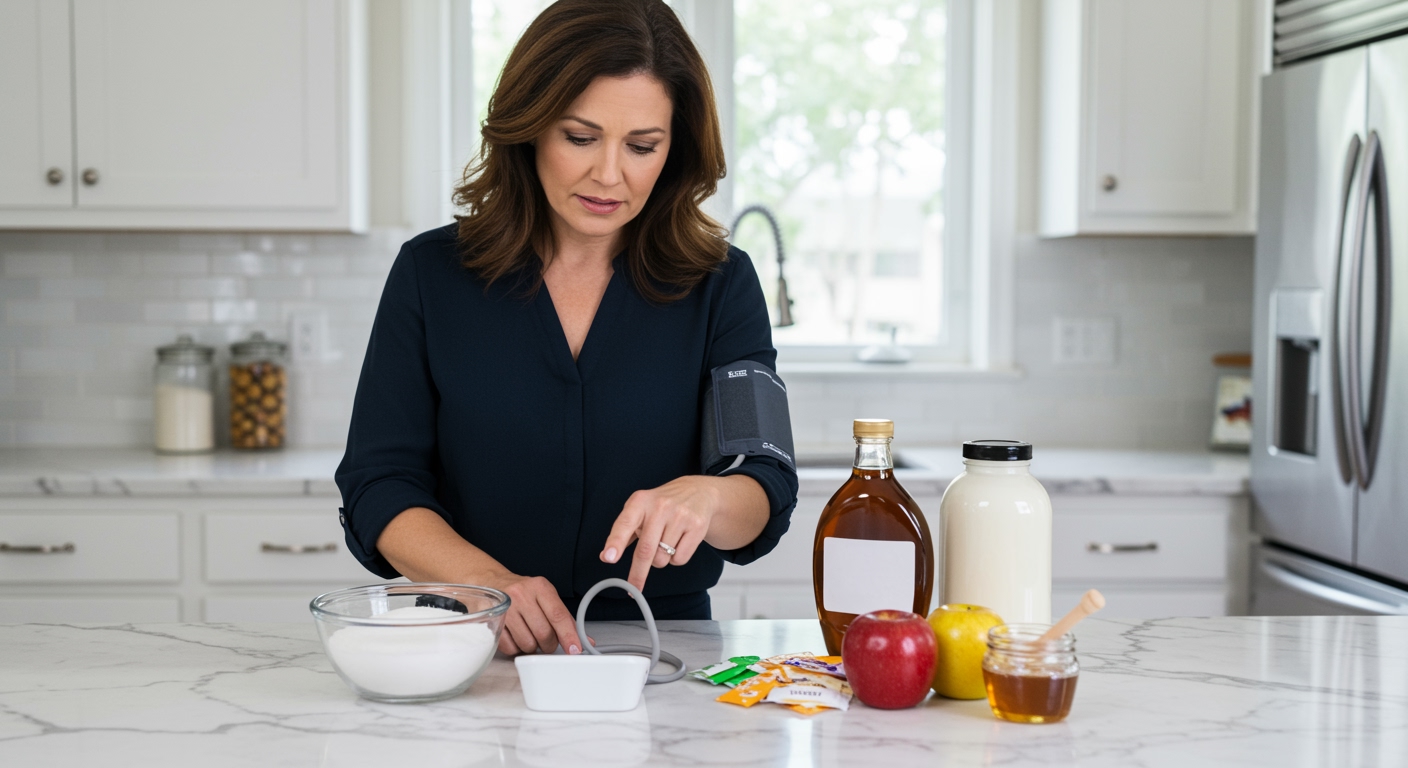✪ Key Takeaway: Sugar can raise blood pressure, but the type and source matter more than the amount you consume.
Introduction
Your doctor tells you to cut salt, but your blood pressure stays high.
You might be wondering if that daily soda or those afternoon cookies could be the real problem behind your rising numbers.
Hi, I’m Abdur, your nutrition coach and today I’m going to explain exactly how sugar affects your blood pressure and what you need to know to protect your heart.
How Does Sugar Actually Raise Blood Pressure?
Sugar raises blood pressure through multiple pathways that most people never learn about.
When you consume added sugars, your body releases insulin to handle the glucose spike.
This insulin surge activates your sympathetic nervous system, which increases your heart rate and constricts blood vessels.
High sugar intake also triggers your kidneys to retain more sodium and water, directly increasing blood volume and pressure.
Research shows that people who consume more than 74 grams of added sugar daily have a 30% higher risk of developing hypertension compared to those eating less than 40 grams.
The fructose component in sugar is particularly problematic because it bypasses normal glucose regulation and goes straight to your liver for processing.
✪ Fact: Just one 12-ounce soda contains about 39 grams of sugar, already close to the daily limit.
Which Types of Sugar Are Worst for Blood Pressure?
Not all sugars affect your blood pressure equally.
High fructose corn syrup is the biggest culprit because it contains up to 55% fructose, which your liver processes differently than glucose.
This processing creates uric acid as a byproduct, which directly interferes with nitric oxide production in your blood vessels.
Nitric oxide helps your blood vessels relax and maintain healthy pressure levels.
Table sugar contains 50% fructose and 50% glucose, making it slightly better than corn syrup but still problematic in large amounts.
Natural sugars from whole fruits come with fiber, which slows absorption and reduces the blood pressure spike.
Studies indicate that people who get their sugar from whole fruits actually have lower blood pressure than those avoiding fruit entirely.
✪ Pro Tip: Choose whole fruits over fruit juices to get natural sugars with protective fiber.
Do Artificial Sweeteners Affect Blood Pressure?
Artificial sweeteners create a complex relationship with blood pressure that surprises many people.
Some studies suggest that aspartame might slightly increase blood pressure in sensitive individuals through its effects on brain chemistry.
However, the evidence remains mixed because artificial sweeteners do not directly trigger the insulin response that causes most sugar-related blood pressure problems.
The bigger concern with artificial sweeteners is that they may increase cravings for sweet foods, leading to higher overall sugar consumption.
Research from the American Heart Association shows that people who regularly consume diet drinks often have higher blood pressure than those who avoid sweetened beverages entirely.
This correlation might be due to other lifestyle factors rather than the sweeteners themselves.
The safest approach is to gradually reduce your preference for sweet tastes rather than substituting artificial options.
✪ Note: Stevia and monk fruit appear to be the safest natural sweetener alternatives for blood pressure.
How Much Sugar Is Safe for Healthy Blood Pressure?
The amount of sugar you can safely consume depends on your current health status and activity level.
The American Heart Association recommends limiting added sugars to 25 grams daily for women and 36 grams for men.
However, if you already have high blood pressure, you should aim for even lower amounts to see meaningful improvements.
Studies show that reducing added sugar intake by just 40 grams daily can lower systolic blood pressure by 6-8 mmHg within two weeks.
This reduction is comparable to the effects of some blood pressure medications.
The key is focusing on added sugars rather than natural sugars from whole foods like fruits and vegetables.
Your body handles natural sugars better because they come packaged with fiber, vitamins, and minerals that support healthy blood vessel function.
✪ Pro Tip: Track your added sugar intake for one week to understand your current consumption patterns.
What Foods Should You Avoid to Control Blood Pressure?
Hidden sugars in processed foods pose the biggest threat to your blood pressure control.
Sugary beverages like sodas, energy drinks, and sweetened teas provide massive sugar doses without any nutritional benefits.
Processed foods like breakfast cereals, granola bars, and flavored yogurts often contain more sugar than obvious treats like cookies.
Condiments and sauces represent another major source of hidden sugars that can sabotage your blood pressure goals.
Ketchup, barbecue sauce, and salad dressings can contain 4-8 grams of sugar per serving.
Restaurant meals often contain shocking amounts of added sugars in marinades, glazes, and sauces that you cannot see or taste.
The solution is reading ingredient labels carefully and choosing whole foods whenever possible to maintain better control over your sugar intake.
✪ Fact: Some pasta sauces contain more sugar per serving than chocolate chip cookies.
The Bottom Line
Sugar definitely affects blood pressure, but the type and source matter more than most people realize.
Your blood pressure responds to what you eat consistently, not what you eat occasionally.
I would love to hear about your experiences with sugar and blood pressure in the comments below, and please share any questions you might have about making healthier choices for your heart.
References
At NutritionCrown, we use quality and credible sources to ensure our content is accurate and trustworthy. Below are the sources referenced in creating this article:
- University of Toronto: Does sugar raise blood pressure? It depends where it comes from
- Open Heart BMJ: Added sugars drive coronary heart disease via insulin resistance and hyperinsulinaemia
- PMC: Sugar-Sweetened Beverages and Risk of Hypertension and CVD
- American Heart Association: Dietary Sugars Intake and Cardiovascular Health





